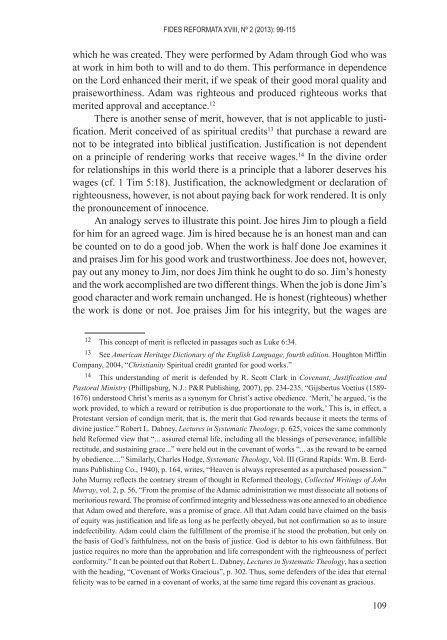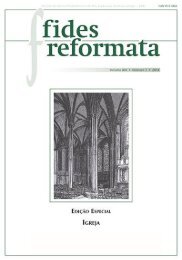Fides 18 N2 - Revista do Centro Presbiteriano Andrew Jumper
Revista Fides Reformata 18 N2 (2013)
Revista Fides Reformata 18 N2 (2013)
You also want an ePaper? Increase the reach of your titles
YUMPU automatically turns print PDFs into web optimized ePapers that Google loves.
FIDES REFORMATA XVIIi, Nº 2 (2013): 99-115<br />
which he was created. They were performed by Adam through God who was<br />
at work in him both to will and to <strong>do</strong> them. This performance in dependence<br />
on the Lord enhanced their merit, if we speak of their good moral quality and<br />
praiseworthiness. Adam was righteous and produced righteous works that<br />
merited approval and acceptance. 12<br />
There is another sense of merit, however, that is not applicable to justification.<br />
Merit conceived of as spiritual credits 13 that purchase a reward are<br />
not to be integrated into biblical justification. Justification is not dependent<br />
on a principle of rendering works that receive wages. 14 In the divine order<br />
for relationships in this world there is a principle that a laborer deserves his<br />
wages (cf. 1 Tim 5:<strong>18</strong>). Justification, the acknowledgment or declaration of<br />
righteousness, however, is not about paying back for work rendered. It is only<br />
the pronouncement of innocence.<br />
An analogy serves to illustrate this point. Joe hires Jim to plough a field<br />
for him for an agreed wage. Jim is hired because he is an honest man and can<br />
be counted on to <strong>do</strong> a good job. When the work is half <strong>do</strong>ne Joe examines it<br />
and praises Jim for his good work and trustworthiness. Joe <strong>do</strong>es not, however,<br />
pay out any money to Jim, nor <strong>do</strong>es Jim think he ought to <strong>do</strong> so. Jim’s honesty<br />
and the work accomplished are two different things. When the job is <strong>do</strong>ne Jim’s<br />
good character and work remain unchanged. He is honest (righteous) whether<br />
the work is <strong>do</strong>ne or not. Joe praises Jim for his integrity, but the wages are<br />
12 This concept of merit is reflected in passages such as Luke 6:34.<br />
13 See American Heritage Dictionary of the English Language, fourth edition. Houghton Mifflin<br />
Company, 2004, “Christianity Spiritual credit granted for good works.”<br />
14 This understanding of merit is defended by R. Scott Clark in Covenant, Justification and<br />
Pastoral Ministry (Phillipsburg, N.J.: P&R Publishing, 2007), pp. 234-235, “Gijsbertus Voetius (1589-<br />
1676) understood Christ’s merits as a synonym for Christ’s active obedience. ‘Merit,’ he argued, ‘is the<br />
work provided, to which a reward or retribution is due proportionate to the work.’ This is, in effect, a<br />
Protestant version of condign merit, that is, the merit that God rewards because it meets the terms of<br />
divine justice.” Robert L. Dabney, Lectures in Systematic Theology, p. 625, voices the same commonly<br />
held Reformed view that “... assured eternal life, including all the blessings of perseverance, infallible<br />
rectitude, and sustaining grace...” were held out in the covenant of works “... as the reward to be earned<br />
by obedience....” Similarly, Charles Hodge, Systematic Theology, Vol. III (Grand Rapids: Wm. B. Eerdmans<br />
Publishing Co., 1940), p. 164, writes, “Heaven is always represented as a purchased possession.”<br />
John Murray reflects the contrary stream of thought in Reformed theology, Collected Writings of John<br />
Murray, vol. 2, p. 56, “From the promise of the Adamic administration we must dissociate all notions of<br />
meritorious reward. The promise of confirmed integrity and blessedness was one annexed to an obedience<br />
that Adam owed and therefore, was a promise of grace. All that Adam could have claimed on the basis<br />
of equity was justification and life as long as he perfectly obeyed, but not confirmation so as to insure<br />
indefectibility. Adam could claim the fulfillment of the promise if he stood the probation, but only on<br />
the basis of God’s faithfulness, not on the basis of justice. God is debtor to his own faithfulness. But<br />
justice requires no more than the approbation and life correspondent with the righteousness of perfect<br />
conformity.” It can be pointed out that Robert L. Dabney, Lectures in Systematic Theology, has a section<br />
with the heading, “Covenant of Works Gracious”, p. 302. Thus, some defenders of the idea that eternal<br />
felicity was to be earned in a covenant of works, at the same time regard this covenant as gracious.<br />
109

















